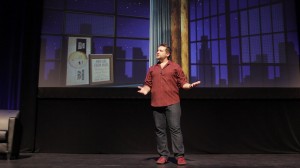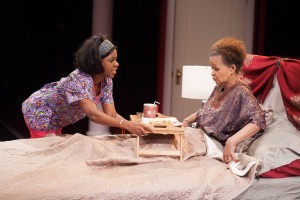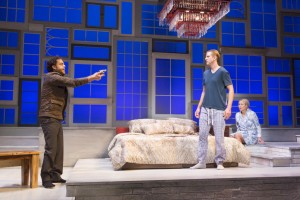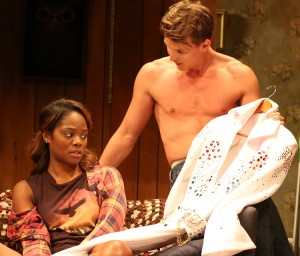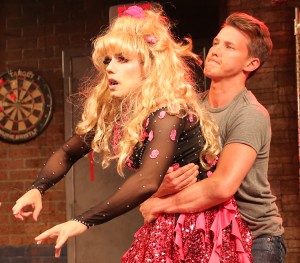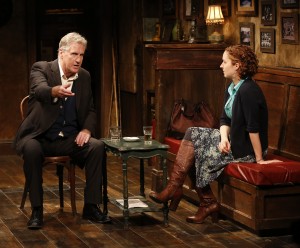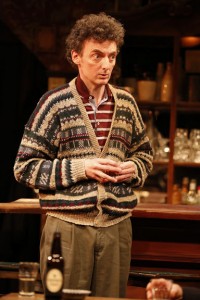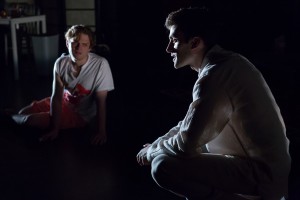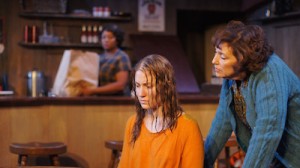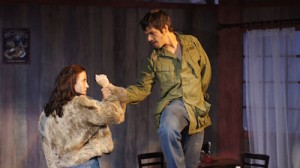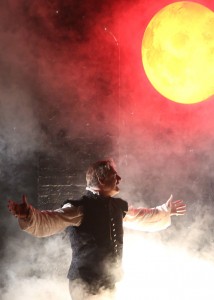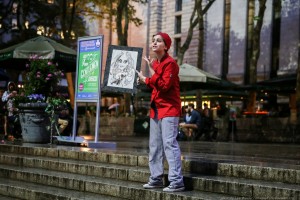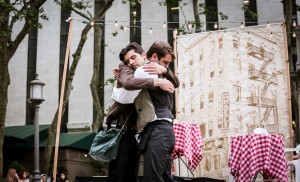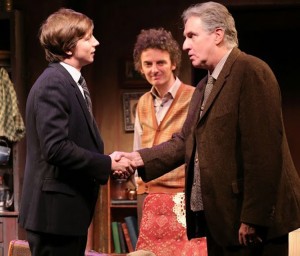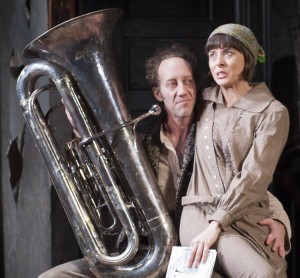Hard and soft qualities and everything in the middle can characterize a man’s masculinity. Mark Borkowski’s two-act comedy The Head Hunter explores masculinity through the contrast of two cousins who take on life’s challenges. Late 30’s writer Casmir (Trenton Clark) and his rugged, older cousin Salvy (Jay Rivera) come from the same family but occur to be from two different worlds.
The production feels more like a family drama and takes place during a winter in Hoboken, New Jersey in Casmir’s outdated apartment. Casmir’s white refrigerator, stove, and oven could have been from the 1950s. The worn rug, antique writing desk and wooden chair with a missing wheel give the impression that Casmir has not left his apartment in years. Casmir’s bland clothes even looks like he sleeps in them and contrasts with Salvy’s new, stylish clothes. Salvy is also taller, stronger and has more facial hair compared with his younger cousin Casmir. The two men do not appear or sound like they are from the same neighborhood.
Salvy challenges Casmir’s ability to stand up to a movie producer who has the rights to Casmir’s screenplay. Casmir mistakenly signed his rights away and does not have enough money to hire a lawyer. Casmir says, “You're right, I was desperate. I needed the money. I needed...the attention. Somebody was recognizin' me.” Casmir and Salvy conspire to get the rights back to Casmir’s script. Casmir prefers to take a polite, gentleman approach when faced with difficult situations and Salvy resorts to brute force. When Casmir finds out that Salvy is a head hunter who decapitates people for the mob, Casmir says, “No, how do we come from the same bloodline?” Salvy says, “What, you sayin' you better [than] me?! ‘Bloodline.’ Hey, don't forget, the same guy who made Christ also made the devil. So go figure. ‘Bloodline.’” Great dialogue like these lines can be heard throughout the play and the value of the production is in Borkowski’s writing.
The writing is worthy of traveling to other markets and easily relates to the modern world. The subject matter is not only limited to New York City and our current time but has universal meaning that can apply to future generations. Borkowski’s writing sheds insight into the varying moral and ethical principles that people adhere by. Casmir says with great honor that his deceased father had pride and Salvy says, “Pride. I love that fuckin' word. Ya know what that word is? It's an excuse, another excuse for a man to keep himself down.” Casmir counters by stating that his father still had a conscience. Salvy later goes on to challenge Casmir’s masculinity and says, “'Cause [you're] soft. Your insides, they gettin' ripe. [You're] ready to be plucked. Forget that, you are plucked. Like a tomato. It hangs nobly on the tree. Whole and hard, as if it's sayin' don't fuck wit me. It gets soft, it falls off the tree and gets squashed. That's what happenin', my friend. You are getting squashed.” The dialogue is brilliant, authentic, thought-provoking and allows audiences to reflect on their own lives.
Director Richard Gekko has an opportunity to insert his own vision and interpretation of the material. It would be interesting to witness Gekko’s slant on the text. Gekko could also improve the overall pacing of the production. The Head Hunter struggles with timing and could be more intentional. For example, the intermission seems to go on too long and could be shortened. Likewise, when Casmir steps out onto the roof, audiences might start to wonder when Casmir will return. Lastly, Rivera could slow down and take some deep breaths before delivering his lines so his performance has time to sink in with audience members. On the other hand, Clark’s timing as Casmir was on point when he spoke and his performance did not feel rushed and scrambled.
When entering the Abingdon Theatre Complex, a poster for The Head Hunter is not visible. The Dorothy Strelsin Theatre is on the second floor and is not easily accessible via the staircase, but there is an elevator. The theater is intimate and audience members feel like they are sitting in the living room of Casmir’s apartment.
The Head Hunter is recommended for theatergoers who love great writing and appreciate seeing family members from different backgrounds coming together to solve a problem. Borkowski captures the natural voice of a broken writer and his criminal cousin. Audiences are able to grasp where each character stands as the plot develops. The contrast between the characters is like looking at two sides of a coin. The vision is clear and the aim is accomplished. The writing carries the show and theatergoers will be keen to see any other productions that Borkowski writes.
The Head Hunter runs until Nov. 28 at The Dorothy Strelsin Theatre in the Abingdon Theatre Complex (312 West 36 St., 2nd Fl., between 8th and 9th Aves.) in Manhattan. Evening performances are Thursday-Saturday at 8 p.m. and matinee performances are Saturday at 2 p.m. and Sunday at 2:30 p.m. Advance evening tickets are $35 and matinee tickets are $20. To purchase tickets, call 212-868-4444 or visit SmartTix.com.









